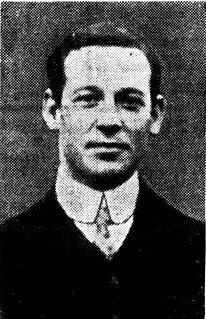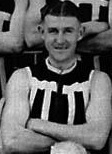Related Research Articles
Robert John Inverarity is a former Australian cricketer who played six Test matches. A right-handed batsman and left-arm orthodox spin bowler in his playing career, Inverarity was also one of the enduring captains in the Australian Sheffield Shield during the late 1970s and early 1980s, captaining both Western Australia and South Australia.
Gilbert Roche Andrews "Gil" Langley was an Australian Test cricketer, champion Australian rules footballer and member of parliament, serving as Speaker of the South Australian House of Assembly from 1977 to 1979 for the Don Dunstan Labor government.
Andrew Paul Sheahan is a former Australian Test cricketer who played 31 Tests and three One Day Internationals as an opening and middle order batsman between 1967 and 1973.

Norman William Jolly was a first-class cricketer and forester. He was South Australia's first Rhodes Scholar.
Harry Surtees Altham was an English cricketer who became an important figure in the game as an administrator, historian and coach. His Wisden obituary described him as "among the best known personalities in the world of cricket". He died of a heart attack just after he had given an address to a cricket society.
Thomas Ronald Garnett OAM was an English and Australian headmaster, horticulturist, ornithologist and author. Before the Second World War, he played first-class cricket for Somerset.
Sir Brian William Hone OBE FACE (1907–1978) was an Australian headmaster and, in his youth, a first-class cricketer.

Allan Robert Charles "Bob" McLean was an Australian rules footballer who played for Port Adelaide and Norwood in the South Australian National Football League (SANFL) and St Kilda in the Victorian Football League (VFL). Affectionately referred to as "Big Bob" McLean, he later became a long serving football administrator in South Australia. He was also a good cricketer, representing South Australia in the Sheffield Shield and topped the Australian bowling and batting averages in 1947.

Richard Smallpeice "Dick" Whitington was an Australian first-class cricketer who played for South Australia and after serving in World War II, represented the Australian Services cricket team, which played in the Victory Tests. He became a journalist, writing as R. S. Whitington.

Alexander Robin Keath is an Australian rules footballer who plays for the Western Bulldogs in the Australian Football League. He formerly played professional cricket for Victoria in Australian domestic cricket.
David Jeremy Hone is an Australian former sportsman who played first-class cricket with Oxford University and Australian rules football for Melbourne in the Victorian Football League (VFL).
Professor Joseph Langley Burchnall was an English mathematician who introduced the Burchnall–Chaundy theory.
Thomas Ainslie Caterer was a leading South Australian cricketer, cricket administrator and educator of the late nineteenth and early twentieth centuries.
The Reverend John Henry Copleston was an English first-class cricketer and clergyman.
The Reverend Allan Cowburn later known as Allan Cowburn-Masters-Smith was an English first-class cricketer and clergyman.
Arthur Clive Pawson was an English first-class cricketer, solicitor and British Army officer.
John Neville Fraser was an Australian first-class cricketer, pastoralist and the father of Australian Prime Minister Malcolm Fraser.
Augustus 'Gus' Damian John Kennedy is an English former first-class cricketer.
Stephen MacDonald Kimpton was an Australian first-class cricketer.
Philip Simon Gerrans is an Australian academic and philosopher, in addition to being a former first-class cricketer.
References
- ↑ Pearce, Suzannah (2007). Who's who in Australia. Herald and Weekly Times. p. 360.
- 1 2 3 4 5 Thornton, Katharine (2010). The Messages of its Walls and Fields. Wakefield Press. p. 298. ISBN 9781862549227.
- ↑ "First-Class Matches played by Richard Burchnall" . CricketArchive. Retrieved 7 January 2020.
- ↑ "First-class Batting and Fielding For Each Team by Richard Burchnall" . CricketArchive. Retrieved 7 January 2020.
- ↑ Little, Liz (6 June 2018). "St Marks College chairman Richard Burchnall standing down following hazing scandal". Nine News . Retrieved 7 January 2020.